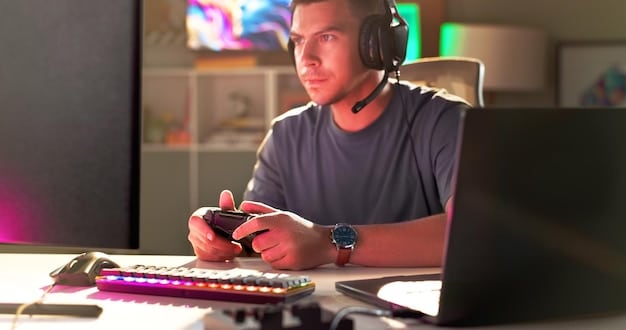PC Gaming & Mental Health: Balancing Your Play and Well-being

PC Gaming and Mental Health: Finding Balance and Avoiding Burnout requires understanding the potential impacts of gaming on mental well-being and implementing strategies to ensure a healthy and sustainable gaming lifestyle.
The immersive world of PC gaming offers excitement and community, but it’s vital to address PC Gaming and Mental Health: Finding Balance and Avoiding Burnout to maintain overall well-being.
Understanding the Link Between PC Gaming and Mental Health
The relationship between PC gaming and mental health is complex. While gaming can provide relaxation and social connection, excessive or uncontrolled gaming can negatively impact mental well-being. Understanding this link is the first step toward finding a healthy balance.
The Positive Aspects of PC Gaming
PC gaming offers numerous benefits for mental health when approached in a balanced manner. It can enhance cognitive skills, provide stress relief, and foster social connections. Exploring these positive aspects can help gamers appreciate the potential advantages of their hobby.
- Cognitive Enhancement: Many PC games require strategic thinking, problem-solving, and quick decision-making, thereby enhancing cognitive functions.
- Stress Relief: Immersing oneself in a game can offer a temporary escape from daily stressors, providing relaxation and mental rejuvenation.
- Social Connection: Online multiplayer games provide opportunities to connect with other players, fostering friendships and a sense of community.
The Negative Aspects of PC Gaming
Despite the positives, excessive PC gaming can lead to several mental health challenges. It can contribute to anxiety, depression, social isolation, and burnout. Recognizing these potential pitfalls is crucial for gamers to take preventive measures.
- Anxiety and Depression: Excessive gaming can lead to anxiety and depression, especially when it interferes with other important life activities.
- Social Isolation: Spending too much time gaming can lead to social isolation, as individuals may neglect real-world relationships and social interactions.
- Gaming Addiction: In severe cases, gaming can become an addiction, characterized by compulsive behavior and negative consequences.

Finding balance requires mindful engagement and moderation. Recognizing signs of potential issues, such as neglecting responsibilities or experiencing withdrawal symptoms when unable to play, is essential for maintaining a healthy relationship with PC gaming.
Recognizing Signs of Gaming-Related Burnout
Gaming-related burnout is a state of emotional, physical, and mental exhaustion caused by excessive or uncontrolled gaming. Recognizing the signs of burnout is crucial for taking timely action and preventing further negative consequences.
Physical Symptoms of Burnout
Burnout manifests through a variety of physical symptoms, including fatigue, sleep disturbances, and physical discomfort. Identifying these symptoms early can prompt individuals to reassess their gaming habits and prioritize physical well-being.
- Fatigue: Persistent tiredness and lack of energy, even after sufficient rest.
- Sleep Disturbances: Difficulty falling asleep, staying asleep, or experiencing restful sleep.
- Physical Discomfort: Headaches, eye strain, and musculoskeletal pain from prolonged sitting and gaming.
Emotional Symptoms of Burnout
Emotional symptoms of burnout include increased irritability, feelings of hopelessness, and a diminished sense of accomplishment. Understanding these emotional indicators can help gamers recognize the psychological impact of excessive gaming.
- Irritability: Increased sensitivity to minor annoyances and a tendency to become easily frustrated.
- Hopelessness: Feelings of despair and a sense that nothing will improve the situation.
- Diminished Sense of Accomplishment: A feeling that gaming is no longer enjoyable or rewarding.
Addressing burnout requires a proactive approach that includes self-care, setting boundaries, and seeking support when needed. By recognizing and addressing these signs, individuals can take steps to restore their well-being and prevent long-term negative effects.
Strategies for Balancing PC Gaming and Mental Well-being
Balancing PC gaming and mental well-being involves implementing practical strategies that promote moderation, self-care, and social connection. These strategies can help gamers enjoy their hobby without sacrificing their mental health.
Setting Time Limits
Establishing and adhering to time limits is essential for preventing excessive gaming and ensuring a healthy lifestyle. Setting realistic boundaries can help individuals allocate time to other important activities and responsibilities.
Using timers or alarms can help track gaming sessions and prevent them from extending beyond the set limits. Regularly reviewing and adjusting these limits based on personal needs and circumstances is also beneficial. Incorporating breaks during longer gaming sessions can help reduce eye strain and fatigue.
Prioritizing Physical Health
Engaging in regular physical activity, maintaining a healthy diet, and ensuring adequate sleep are crucial for overall well-being. These practices can counteract the negative physical effects of prolonged gaming and promote mental clarity.

Simple activities such as stretching, walking, or engaging in light exercises can significantly improve physical health. Avoiding excessive consumption of sugary or processed foods and prioritizing a balanced diet are also important. Aiming for 7-9 hours of quality sleep each night can improve cognitive function and emotional stability.
Balancing gaming with physical health involves making conscious choices to prioritize well-being. By incorporating these strategies, gamers can maintain a healthy and sustainable gaming lifestyle.
Cultivating Healthy Gaming Habits
Adopting healthy gaming habits is vital for maintaining a positive relationship with PC gaming. These habits include mindful gaming practices, creating a supportive gaming environment, and balancing online and offline interactions.
Mindful Gaming Practices
Mindful gaming involves being aware of your emotions, motivations, and behaviors while gaming. This can help you identify potential issues and make informed decisions about your gaming habits.
Pay attention to how gaming makes you feel and recognize when it starts to become stressful or overwhelming. Take breaks when needed and avoid using gaming as a coping mechanism for dealing with negative emotions. Engage in self-reflection after gaming sessions to assess your experience and identify areas for improvement.
Creating a Supportive Gaming Environment
A supportive gaming environment is one that promotes positive interactions, respect, and inclusivity. Surround yourself with friends and communities that share similar values and support your well-being.
- Positive Interactions: Engage in friendly and respectful interactions with other players.
- Respect: Treat others with courtesy and avoid engaging in toxic or harmful behavior.
- Inclusivity: Welcome and support players from diverse backgrounds and experiences.
By cultivating these healthy gaming habits, individuals can create a sustainable and fulfilling gaming experience that enhances their overall well-being.
Seeking Help When Needed
Recognizing when to seek help is an essential part of maintaining mental health while gaming. Mental health professionals and support networks can provide valuable assistance in addressing gaming-related issues and developing coping strategies.
Identifying When Help is Necessary
Certain signs indicate that professional help may be needed. These include experiencing persistent feelings of anxiety or depression, neglecting responsibilities, or feeling unable to control gaming habits.
- Persistent Anxiety or Depression: Ongoing feelings of sadness, worry, or hopelessness.
- Neglecting Responsibilities: Difficulty fulfilling work, school, or personal obligations due to gaming.
- Loss of Control: Feeling unable to stop gaming even when wanting to do so.
Resources for Mental Health Support
Numerous resources are available for individuals seeking mental health support. These include online support groups, therapy services, and mental health hotlines.
- Online Support Groups: Websites and forums that provide a safe space for individuals to share their experiences and receive support.
- Therapy Services: Professional counseling services offered by licensed therapists and psychologists.
- Mental Health Hotlines: Crisis hotlines that provide immediate support and guidance during times of distress.
Seeking help is a sign of strength and can lead to significant improvements in mental health and overall well-being. By accessing these resources, individuals can receive the support they need to navigate their gaming habits and lead a balanced life.
The Role of Parents and Educators
Parents and educators play a crucial role in promoting healthy gaming habits among young individuals. Education, open communication, and setting appropriate boundaries are essential for fostering a positive relationship with PC gaming.
Educating Children About Responsible Gaming
Educating children about the potential risks and benefits of PC gaming can empower them to make informed decisions about their gaming habits. This includes teaching them about the importance of moderation, self-care, and responsible online behavior.
Encourage open discussions about gaming and its impact on mental and physical health. Provide age-appropriate information about gaming addiction and the warning signs to watch out for. Help children develop critical thinking skills to evaluate information they encounter online and make responsible choices.
Setting Boundaries and Promoting Balance
Setting clear boundaries and promoting a balanced lifestyle can help prevent excessive gaming and foster healthy development. This includes establishing time limits, encouraging physical activity, and promoting engagement in other hobbies and activities.
Collaborate with children to create a gaming schedule that allows for adequate time for school, chores, and other important activities. Encourage participation in sports, outdoor activities, and other hobbies that promote physical and mental well-being. Model healthy habits by demonstrating a balanced lifestyle and setting a positive example.
By actively engaging in their children’s gaming experiences and providing guidance and support, parents and educators can help promote healthy gaming habits and foster a positive relationship with PC gaming.
| Key Point | Brief Description |
|---|---|
| ⏱️ Time Limits | Set boundaries to prevent excessive gaming. |
| 💪 Physical Health | Prioritize exercise, diet, and sleep. |
| 🤝 Supportive Environment | Cultivate positive interactions in gaming. |
| 🧠 Mindful Gaming | Be aware of your emotions and motivations while gaming. |
FAQ
To balance PC gaming with your mental health, set time limits, prioritize physical activities, maintain a healthy diet, and get enough sleep. Also, engage in mindful gaming and recognize when to take breaks.
Signs of gaming-related burnout include persistent fatigue, sleep disturbances, increased irritability, feelings of hopelessness, and a diminished sense of accomplishment from gaming.
Parents can educate their children about responsible gaming, set clear boundaries, promote a balanced lifestyle, and actively engage in their children’s gaming experiences to offer guidance and support.
If you feel like you’re losing control, seek help from mental health professionals, join online support groups, or use mental health hotlines. These resources can provide guidance and coping strategies.
Yes, when approached in a balanced manner, gaming can enhance cognitive skills, provide stress relief, and foster social connections. Mindful gaming can offer mental rejuvenation and relaxation.
Conclusion
In conclusion, PC Gaming and Mental Health: Finding Balance and Avoiding Burnout is crucial for a sustainable and enjoyable gaming lifestyle. By understanding the potential impacts, adopting healthy gaming habits, and seeking help when needed, gamers can ensure their well-being remains a top priority.





